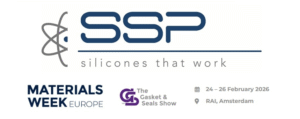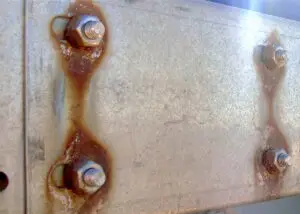EMI gasket manufacturers can fabricate a range of products from electrically conductive silicones. That’s important since different challenges with environmental sealing and EMI shielding require different solutions.
For example, industrial robots require molded or bonded EMI O-rings that fit into a groove. Enclosures may require flat EMI gaskets that are die-cut or flash-cut instead. There are also EMI shielding applications with electronic displays that need custom-molded parts.
Specialty Silicone Products (SSP) stands out among EMI gasket manufacturers because we make our own materials and offer lower minimum order quantities (MOQs) than the competition. That’s not all either.
Because we have our own in-house machine shop and production equipment, we offer faster turnaround times. Plus, SSP has an R&D team and in-house laboratory. Keep reading to learn more and contact SSP for ready-to-fabricate materials or ready-to-install products.
EMI Gasket Manufacturers: Capabilities
Not all EMI gasket manufacturers mold raw compounds. In fact, some can only cut flat sheets. There are also differences in how gasket fabricators bond the cut lengths of extrusions or sections of cut sheets.
To ensure electrical conductivity, it’s critical for a fabricator to use conductive bonding materials that match the properties of the elastomer itself. Considerations include the EMI silicone’s temperature range, strength, and shielding capability.
Among EMI gasket manufacturers, SSP stands out because we’re vertically integrated. We make our own materials at our ISO 9001:2015 certified facility, and we can supply them for distribution or fabricate them into EMI gaskets and EMI O-rings.
Certified Spec-Grade Materials
There’s not just one type of EMI elastomer, and some projects require military gaskets that meet the MIL-DTL-83528 specification. There’s also a difference between claiming to meet the requirements of this spec and achieving a qualified product listing (QPL) from the Defense Logistics Agency (DLA).
For defense contractors, partnering with a fabricator that is DLA-listed, uses QPL-certified materials, and can provide a Certificate of Analysis (COA) with every batch is the key to compliance. SSP’s MIL-DTL-83528 materials are part of the M83528 QPL, and that’s another reason we stand out.
EMI Silicones for Specific Challenges
EMI gasket manufacturers also differ in their ability to solve application-specific challenges. For example, if a housing’s compression force is limited, a shielding silicone with a low Shore A durometer is needed. Consider these additional examples.
- In marine environments, EMI silicones tested to ASTM B117 resist galvanic corrosion.
- With satellite communications, materials tested to ASTM D75 Method A have low levels of silicone outgassing.
- Flame-retardant EMI silicones that meet UL 94V-0 flammability requirements are required for EV and rail applications.
SSP makes EMI shielding elastomers for all of these scenarios and more.
Design Engineering and R&D Support
Some customers know exactly what they need, but most want an EMI gasket manufacturer who can help with material selection and gasket design. There’s even greater value in partnering with a fabricator with an in-house research and development (R&D) team that develops custom compounds.
With the right engineering and R&D resources, a material supplier that’s also an EMI gasket fabricator can also recommend the lowest-cost form factors for the EMI silicones that it makes. Among EMI gasket manufacturers, SSP has a large R&D team for our size – and they’re ready to help.
Material Supplier and EMI Gasket Manufacturer
Specialty Silicone Products (SSP) makes EMI silicones and supplies them as sheets, rolls, extrusions, and ready-to-mold compounds. We also fabricate these materials into bonded and molded EMI O-rings, flash-cut and die-cut EMI gaskets, and custom-molded parts.
The materials we produce include QPL-certified MIL-DTL-83528 elastomers and low-durometer, corrosion-resistant, low-outgassing, and flame-retardant EMI silicones. SSP offers a COA with each batch and, because we have an in-house R&D team, can also provide custom silicone products.
For fabricated products like EMI gaskets and EMI O-rings, we offer compression molding, flash cutting, and die cutting services. Compression molding and flash cutting are ideal for prototyping and lower volumes. Die cutting requires tooling and is used for higher volumes.
All EMI Gasket Manufacturers Aren’t the Same
SSP’s engineers, polymer chemists, and R&D technicians have completed many projects that distinguish us from other EMI gasket manufacturers.
Examples include the development of a low-temperature phenyl nickel-graphite-filled product with optimal low-temperature properties and rolls of a highly-conductive silver-aluminum product for critical electrical board applications. SSP has also developed a 40-durometer nickel-graphite silicone that is a UL 94 V0 flame-resistant, low-outgassing alternative to GORE 2100.
Are you comparing EMI gasket manufacturers? Contact SSP and learn more about why we’re different.





